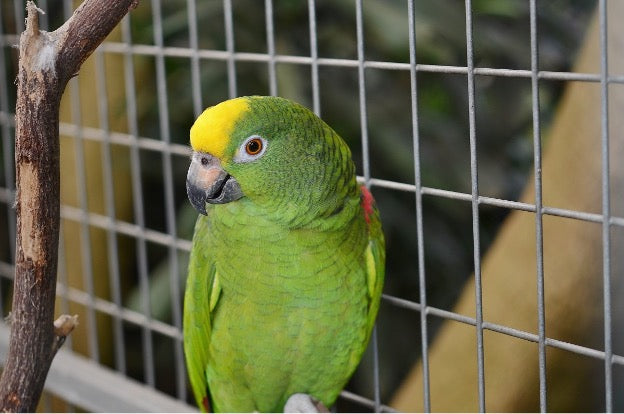
Finding the Perfect Bird Cage: Your Ultimate Guide to a Happy Bird
Welcome to your comprehensive guide on choosing the ideal bird cage for your feathered friend!
If you've ever wondered, "What bird cage to buy?" you're in the right place. In this blog post, we'll explore everything you need to consider to ensure your bird's comfort, safety, and happiness.
Determine Your Bird's Needs
Size Matters: Assess the size of your bird and choose a cage that provides ample space for them to move around, stretch their wings, and exercise. Generally speaking, the more room the better! A general rule of thumb for minimum sizing is the cage should allow your bird double the size of their wing span for optimal comfort
Bar Spacing: Different bird species require different bar spacing to prevent escape or injury. Below we have highlighted particular bird sizes and breeds with what bar spacing is best for their safety and security:
Small Birds (e.g., Budgies, Canaries, Finches)

Medium Birds (e.g., Cockatiels, Lovebirds, Conures)
Bar Spacing: 1/2 to 5/8 inch (1.3 to 1.6 cm)
Medium-sized birds need slightly wider bar spacing to accommodate their size and prevent them from getting stuck between the bars.

Large Birds (e.g., African Greys, Amazons, Cockatoos)

Extra Large Birds (e.g., Macaws, Large Cockatoos):

Other Words of Wisdom
It's important to note that these are general recommendations, and individual bird breeds may have specific requirements that differ from the above. Always consult with a veterinarian or avian expert for personalized advice based on your bird's breed, size, and any health conditions that may impact their cage needs.
As a reminder, regularly inspect the cage for any signs of wear or damage to ensure your bird's safety. If you do recognize any damaged areas of the cage, we recommend you remove your feathered friend and repair any issues before placing them back inside.
Consider Cage Features
Accessibility: Choose a cage with easy-access doors and removable trays for convenient cleaning and maintenance.
Perches and Accessories: Look for cages that come with perches and accessory hooks to enrich your bird's environment with toys, swings, and feeding stations.
Seed Guards: Consider cages with seed guards to minimize mess and keep your bird's living area clean.
Material: Opt for non-toxic materials like stainless steel or powder-coated metal to ensure your bird's safety. While stainless steel cages may cost more initially, this material is designed to last your feathered friend a lifetime!
Evaluate Cage Design
Horizontal vs. Vertical Space: Depending on your bird's species, consider whether they prefer horizontal or vertical space for flying and perching.
Cage Shape: Rectangular cages are ideal for most birds as they provide ample space for movement. However, some birds may prefer round cages for added visual stimulation.

